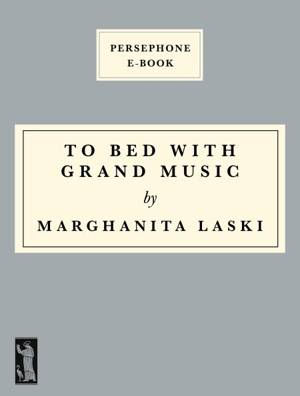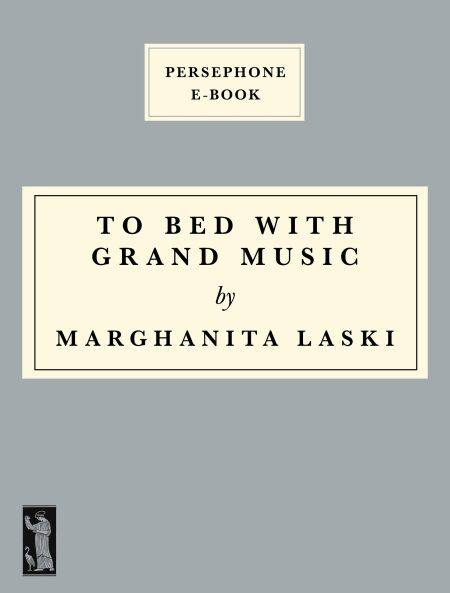
- Afhalen na 1 uur in een winkel met voorraad
- Gratis thuislevering in België vanaf € 30
- Ruim aanbod met 7 miljoen producten
- Afhalen na 1 uur in een winkel met voorraad
- Gratis thuislevering in België vanaf € 30
- Ruim aanbod met 7 miljoen producten
Omschrijving
To Bed with Grand Music, first published in 1946, is about sex in wartime. On the first page (a scene as compelling in its way as the five conception scenes at the beginning of the novel Manja, also published by Persephone) Deborah and her husband are saying goodbye to each other before he is posted overseas. They swear undying loyalty, well, undying emotional loyalty because the husband does not deny that he might not be able to be faithful all the time he is away. But once he is gone, Deborah is soon bored by life in a village with her small son and decides to get a job in London. Here she acquires a lover, and another, and another. As Juliet Gardiner, the historian, says in her Preface, this is a near harlot's tale. But she admires the book very much because it shows such a different side of the war from that shown in, for example, Jocelyn Playfair's A House in the Country, which is full of people mostly behaving honourably.
The title of To Bed with Grand Music comes from an essay by Sir Thomas Browne called 'On Dreams' where he writes, 'Happy are they that go to bed with grand music, like Pythagoras, or have ways to compose the fantastical spirit, whose unruly wanderings take off inward sleepe.' And indeed Deborah is both happy at going to bed with grand music, and unruly. Although this is, in some ways, a rather shocking book, it is also very funny. There is a scene when she is making a gesture about resisting her first lover and he says that if his wife was in the same position as Deborah, i.e. with her husband away possibly for a long time, he would want her to have a lover so that she would not be bad-tempered. This is rather typical of the ironic, sardonic, yet possibly realistic tone of the book, which certainly throws light on the wartime years in a quite different way from any other novel that we know of.
In To Bed with Grand Music, writes Juliet Gardiner, Deborah Robertson 'definitely does not keep the home fires burning while her husband is away at war. Soon, all too predictably, rather than staying in in the evening eating a tin of baked beans and reading the evening paper, she embarks on a series of affairs, each with a progressively rather less upright character than the one before. Hers is now a world of smart restaurants, cocktail bars, nightclubs, little black dresses, frivolous concoctions of hats, jewels and black market perfume – rather reminiscent of the world evoked in some of Mollie Panter-Downes' short stories Good Evening, Mrs Craven, particularly in the eponymous story.' Deborah, however, is not prepared to wait around loyally for either husband or lover...
'The fascination of To Bed with Grand Music,' continues Juliet Gardiner, 'is its unusual recreation of one aspect of the Home Front in the Second World War... The book's appeal lies in its portrayal of someone who signally failed the "test of war", and in its evocation of a fractured and transient society during the exigencies and contingencies of wartime. However, although To Bed with Grand Music chronicles immorality, it is not in itself an immoral book, although it is a cautionary one. This is an ahead-of-the-pack telling of an aspect of the civilian's war it was not yet acceptable to reveal, exposing aspects of its darker side, its other wounds. Deborah, pretty much a tart without a heart by mid-way through the book, exemplifies war's dark underside, its heightened passions – the undoubted eroticism of danger – its moral fragility and pervasive aura of contumely and temptations succumbed to.' It is hardly surprising, then, that Marghanita Laski chose to publish this, her second novel, under the pseudonym Sarah Russell, and the identity of the true author was not revealed for many years.
Specificaties
Betrokkenen
- Auteur(s):
- Uitgeverij:
Inhoud
- Taal:
- Engels
Eigenschappen
- Productcode (EAN):
- 9798227651129
- Verschijningsdatum:
- 14/10/2024
- Uitvoering:
- E-book
- Formaat:
- ePub

Alleen bij Standaard Boekhandel
Beoordelingen
We publiceren alleen reviews die voldoen aan de voorwaarden voor reviews. Bekijk onze voorwaarden voor reviews.











